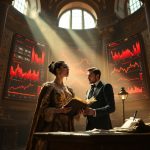
Market Factors Are Similar to Market Indicators Except That: The Truth Revealed
May 25, 2024
Introduction: Market Factors and the Art of Strategic Thinking:
The game of chess and the dynamics of market factors share a fascinatingly similar strategic depth. As chess players must anticipate their opponent’s moves, investors and economists must predict market behaviour. Both involve a delicate balance of offensive and defensive strategies, and a misstep can lead to defeat. This essay explores the interplay between market factors and strategic thinking, drawing on insights from mass psychology, game theory, and the wisdom of brilliant minds from across the globe and throughout history.
Market Factors: The Building Blocks of Economic Strategy
Market factors are the fundamental elements that influence market behaviour. They are the bricks and mortar of economic strategy, providing the foundation for understanding market dynamics. These factors include tangible aspects such as supply and demand, pricing, and competitive forces, as well as intangible factors such as consumer confidence and market sentiment.
Just as a chess player assesses the position of pieces on the board, economists and investors must analyze market factors to make informed decisions. However, the challenge lies in recognizing that these factors are not static. They are subject to constant change, influenced by a myriad of internal and external variables. This is where the art of strategic thinking comes into play.
The Dynamic Nature of Market Indicators
Market indicators are the vital signs of a market, providing insight into its current state and potential future direction. These indicators are derived from market factors and provide a snapshot of market behaviour. For example, stock prices are an indicator of investor sentiment and the overall health of a company or industry.
While market factors are the building blocks, indicators are the signals that help players make their moves. A chess player might observe their opponent’s piece placements and interpret them as indicators of an impending attack or a defensive manoeuvre. Similarly, economists and investors interpret market indicators to anticipate market movements and adjust their strategies accordingly.
So, where does the distinction lie between market factors and indicators? Market factors are the underlying structures and drivers of the market, while indicators are the measurable outcomes and signals that result from the interplay of those factors. Factors provide the context, and indicators provide insight into the market’s reaction to that context.
Mass Psychology and the Market
Market factors and indicators are not just about numbers and data; they are deeply influenced by human behaviour and mass psychology. This is where the game becomes even more intriguing. Just as a chess player must anticipate their opponent’s next move, understanding the psychology behind it, so must market players interpret the collective behaviour of investors, consumers, and businesses.
The herd mentality is a powerful force in markets. Investor sentiment can drive market trends, and fear or greed can lead to irrational decisions. A slight shift in market sentiment can have a ripple effect, causing a cascade of decisions that impact the broader economy. Thus, understanding the psychology of market players is crucial for predicting and influencing market behaviour.
As the great Chinese philosopher Sun Tzu wrote in The Art of War over 2,500 years ago, “Know your enemy and know yourself, and you can fight a hundred battles with no danger of defeat.” In the context of market strategy, this translates to understanding the motivations and behaviours of market participants and recognizing one’s biases and limitations.
The Psychology of Risk and Reward
One fascinating aspect of market dynamics that merits exploration is the psychology of risk and reward. Just as a chess player must weigh each move’s potential risks and rewards, investors and economists must navigate the delicate balance between risk and potential gain in the market.
As described by behavioural economists Amos Tversky and Daniel Kahneman, the concept of loss aversion suggests that humans feel the pain of a loss more acutely than the pleasure of an equivalent gain. This psychological factor can lead to irrational decision-making in the face of market volatility.
Moreover, “prospect theory” posits that people make decisions based on the potential value of losses and gains rather than the outcome. This means that market participants may take more significant risks to avoid a loss than to secure a gain, even if the result is the same.
Understanding these psychological factors is crucial for developing effective market strategies. Just as a chess player must sometimes sacrifice a piece for a more significant advantage, investors and economists must be willing to take calculated risks in pursuit of long-term gains.
By incorporating an awareness of the psychology of risk and reward into their strategic thinking, market players can make more informed decisions and potentially outmanoeuvre their competitors. This subtle yet powerful factor adds another layer of complexity to the already intricate game of market dynamics.
Strategic Thinking and the Art of Chess
Chess is a game of infinite possibilities, and the best players can think several moves ahead, anticipating their opponent’s strategies and adapting their own accordingly. This level of strategic thinking requires an understanding of patterns and probabilities and the ability to take calculated risks.
Consider the mindset of a chess player studying the board. They assess the current position, evaluate potential moves, and predict their opponent’s countermoves. They must balance offence and defence, knowing when to push forward and when to consolidate their position. This delicate dance of strategy mirrors the decision-making process in economic markets.
The Russian chess grandmaster Garry Kasparov, who dominated the game for over two decades, understood the importance of this strategic mindset. He once said, “A world champion must always analyze carefully and never forget even the smallest detail. He must have a fantastic memory and be able to calculate variations with the speed of a computer.” This description could easily apply to a successful investor or economist, who must process vast amounts of data, identify patterns, and make swift yet calculated decisions.
The Wisdom of Brilliant Minds
Throughout history, brilliant thinkers have offered insights into strategic thinking and decision-making that resonate with market factors and indicators.
1. Sun Tzu (China, 6th century BC): As mentioned earlier, Sun Tzu’s “The Art of War” is a treasure trove of strategic wisdom. His principles of knowing oneself and the enemy, adapting to changing circumstances, and using deception to gain an advantage are highly applicable to market strategy.
2. Niccolò Machiavelli (Italy, 1469-1527): Machiavelli’s “The Prince” offers insights into the art of power and strategy. He emphasizes the importance of understanding the forces at play, adapting to changing circumstances, and using cunning to achieve one’s goals. Machiavelli writes, “Hence it is that all armed prophets have conquered, and the unarmed ones have failed,” recognizing the importance of strategic power.
3. Adam Smith (Scotland, 1723-1790): Smith, often considered the father of modern economics, revolutionized market thinking with his concept of the “invisible hand.” In his book “The Wealth of Nations,” Smith argues that market forces, driven by individual self-interest, naturally lead to beneficial outcomes for society. This highlights the power of market factors and the role of individuals within them.
4. Karl Marx (Germany/England, 1818-1883): Marx, a critical thinker and economist, offered a contrasting view to Smith’s market-driven philosophy. In “Das Kapital,” Marx analyzed the factors of capitalist production and the dynamics between labour and capital. He recognized the power of economic indicators and the impact of market forces on society, arguing for a more equitable distribution of wealth.
5. Simón Bolívar (Venezuela, 1783-1830): As a South American revolutionary leader, Bolívar understood the interplay of economic and political forces. He recognized economic indicators’ importance and impact on a nation’s strength and sovereignty. Bolívar once said, “A people that does not advance retreats,” emphasizing the need for progressive economic strategies.
The Impact of Technology
Just as chess has evolved with the introduction of computer algorithms and artificial intelligence, so has the field of economic strategy. Today, market players can access vast amounts of data and advanced analytical tools. This has led to a more nuanced understanding of market factors and developing sophisticated predictive models.
However, with this increased reliance on technology comes the challenge of maintaining a human-centric perspective. The human factors of mass psychology and behavioral economics cannot be overlooked. As the game becomes more complex, the player’s strategic mindset becomes even more critical.
Conclusion: The Art of Strategic Thinking in a Dynamic World
Market factors and indicators provide the foundation for strategic decision-making in the economic arena, much like the position of chess pieces on a board. Successful investors and economists must adopt a chess player’s mindset, anticipate market movements, understand mass psychology, and adapt their strategies accordingly.
The wisdom of brilliant minds throughout history underscores the importance of strategic thinking. From Sun Tzu to Bolívar, these thinkers emphasized the need to understand one’s environment, adapt to change, and recognize the interplay of human behaviour and market forces.
As technology continues to shape the landscape, the ability to process and interpret vast amounts of data becomes increasingly crucial. However, the human element, the art of strategic thinking, remains at the heart of successful economic decision-making.
In the complex game of market dynamics, the players who thrive can balance analytical prowess with a deep understanding of human nature, much like a chess grandmaster. They recognize that market factors are the building blocks, while indicators are the signals that guide their strategic moves. Ultimately, this combination of analytical and intuitive thinking leads to success in the ever-changing world of economics.
Hidden Narratives: Unearthing Rare and Valuable Stories












